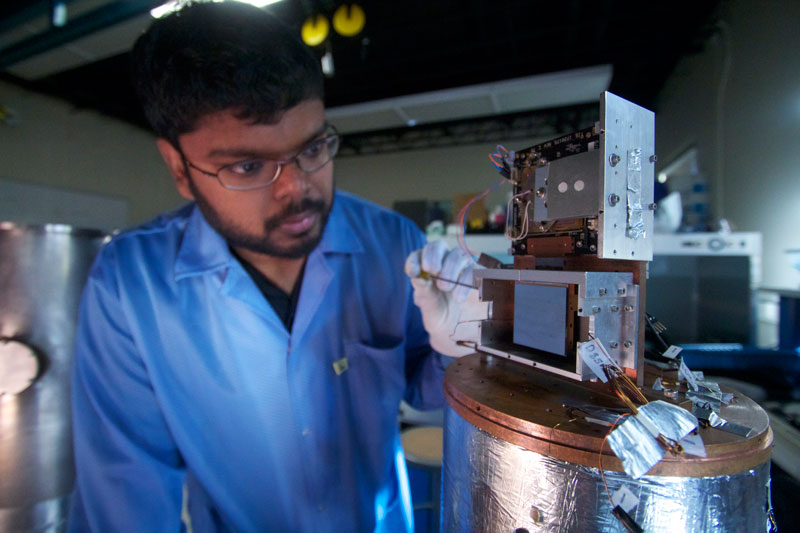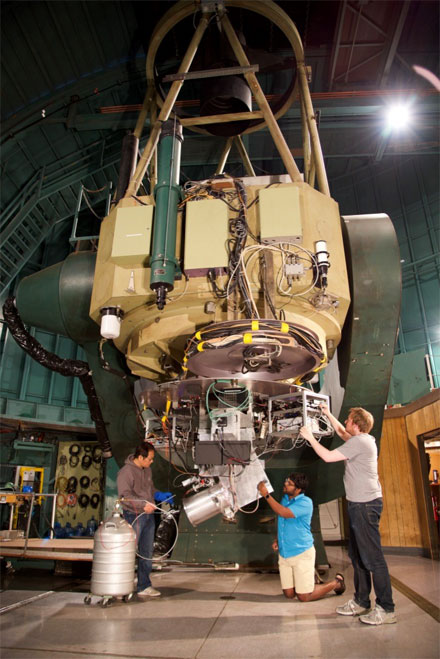About This Webinar
What tools and equipment will be needed for 21st century astronomy? In this webinar, you will learn about innovative optical approaches to astronomy to support research at a global level.
The webinar will cover optical and IR instruments for astronomy, with a particular focus on how innovations in adaptive optics and IR spectroscopy are pushing the technical and scientific envelope. In addition, the speaker will describer the Gemini infrared multi-object spectrograph (GIRMOS), a novel Canadian instrument being developed for the Gemini observatory. GIRMOS takes advantage of the latest developments in adaptive optics and imaging spectroscopy to probe the distant universe.
The speaker will discuss how these optical tools can be used to make extremely sensitive and high fidelity measurements of astronomical objects at next-generation extremely large optical telescopes like the Thirty Meter Telescope (TMT). These observations will be able to probe into the distant universe and allow astronomers to see the formation and evolution of galaxies, and more. The design and fabrication of novel astronomical instrumentation will be covered from both a scientific and an engineering standpoint.
About the speaker:

Professor Suresh Sivanandam. Courtesy of the Dunlap Institute for Astronomy and Astrophysics.
Suresh Sivanandam, Ph.D., is an assistant professor at the Dunlap Institute for Astronomy and Astrophysics at the University of Toronto. He studies the formation and evolution of galaxies in clusters; and one focus of his research is a spectroscopic survey of nearby galaxies to see if their stellar populations differ significantly from predictions. This survey will be conducted with a unique instrument that Sivanandam and his collaborators have recently commissioned at Kitt Peak, USA: the Wide Integral-Field Infrared Spectrograph, or WIFIS.
In addition to WIFIS, Sivanandam is a key member in many instrument projects. At Dunlap, he is principal investigator for GIRMOS, which is a facility-class instrument that will be commissioned at the 8-meter Gemini Observatory in 2023. He is also involved in the development of future capabilities for TMT, where GIRMOS will serve as a pathfinder for a future TMT instrument.

Sivanandam and colleagues with the Wide Integral-Field Infrared Spectrograph WIFIS) at Kitt Peak. Courtesy of the Dunlap Institute for Astronomy and Astrophysics.
Sivanandam became an assistant professor at the Dunlap Institute in 2015. He was a Dunlap Fellow at the University of Toronto from 2010-2015. He received his Ph.D. in Astronomy, with a minor in optical sciences, from the University of Arizona in 2010. He received his M.S. in Astronomy from the University of Arizona in 2007 and his B.S. in Physics and Astronomy from the University of British Columbia in 2004.
Who should attend:
Optics engineers, designers and other technical professionals who design and/or build optical instruments. Anyone, including citizen scientists, who is interested in the technology that is being used to advance astronomical exploration today.
Astronomers at the Dunlap Institute recently performed one of the highest-resolution observations in astronomical history.
Read the story.